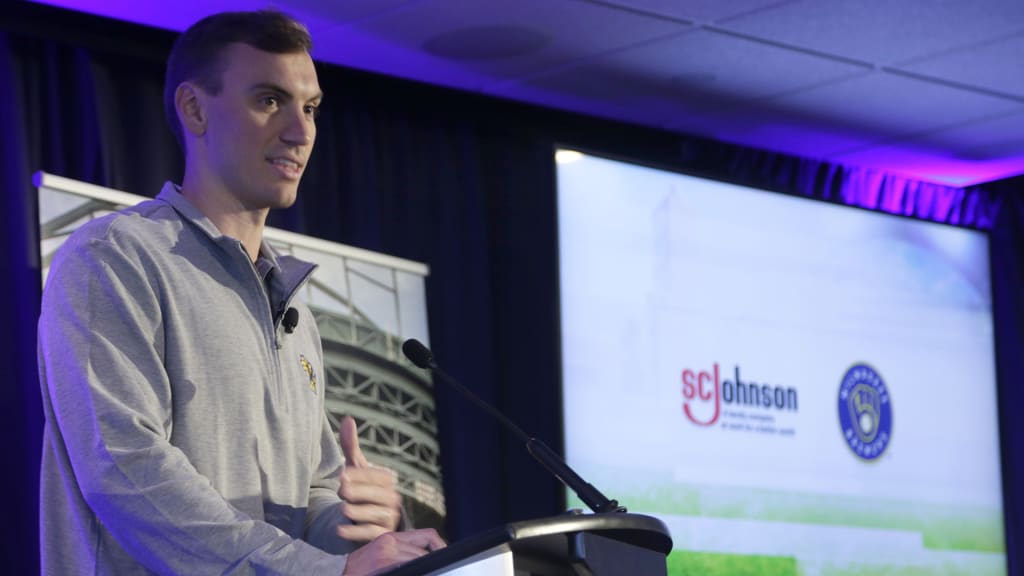
MILWAUKEE -- Even in this strangest of seasons, baseball¡¯s greenest player is considering ways to help the planet.
Suter is the Brewers¡¯ nominee for the Roberto Clemente Award, presented annually to the player who best represents the game through extraordinary character, community involvement, philanthropy and positive contributions on and off the field. That certainly describes Suter, who has been working to raise the environmental consciousness of his teammates and fans alike since he convinced teammates to adopt reusable glass bottles over the thousands of single-use plastic bottles a team typically goes through.
Since then, Suter has been the public face of a program to recycle the million-plus plastic cups used at Miller Park in a typical season into bottles of SC Johnson¡¯s ¡°Scrubbing Bubbles¡± cleaner. And next on his list of initiatives is team travel. Suter recently partnered with the American Conservation Coalition Campus, The Nature Conservancy and Players for the Planet on a program called Sidelining Carbon, focused on reducing the impact of professional sports team travel.
¡°You¡¯re seeing the role that athletes play on a lot of really important social issues right now, from race and income inequality to climate,¡± said ACC Campus president (and Appleton, Wis., native) Benji Backer. ¡°The impact Brent has had by being one of the most active advocates in the community is massive.¡±
Suter and the other nominees will be officially recognized Wednesday on the 19th annual Roberto Clemente Day. An overall winner will be selected via a blue ribbon panel that includes Commissioner Rob Manfred, representatives from MLB-affiliated networks and MLB.com, as well as Roberto¡¯s children, Enrique, Luis and Roberto Jr.
Fans can vote for the Roberto Clemente Award via?mlb.com/clemente21.
Over the weekend, Suter spoke to MLB.com about his passion for the planet. Here are some highlights from that conversation:
MLB.com: With so much focus on the pandemic and social justice in America at the moment, do you worry that other important issues won¡¯t get the attention they deserve?
I think they¡¯re all kind of related, in terms of the pandemic showing us that our society is indeed vulnerable. The invincibility -- the denial of climate change really affecting us in our lifetime -- it seems to be fading. People are like, "Wow, if this virus can shut things down, imagine what more superstorms, more droughts, more fires, more extreme weather, more extreme ecosystem breakdown can do?"
So, I think climate change on the back burner in some respects might be a good thing in terms of opening up people¡¯s minds to the possibility that we might be on a course we need to change.
MLB.com: What do you think of when you hear Roberto Clemente¡¯s name?
I think of a barrier-breaker, similar to Jackie Robinson. You know, he was really one of the first Latin American ballplayers through the door and had to deal with a lot of prejudice, a lot of people doubting him, a lot of people pushing him away. He just kept [moving] on with courage, on and off the field.
He was an amazing person, was obviously really involved in humanitarian work, cared about his country, cared about all people. He died trying to give aid to victims of an earthquake in Nicaragua.
What a life, what an example. He is really in many ways similar to Jackie Robinson in terms of his impact in the game, and I really think his No. 21 should be retired throughout all of baseball. Too powerful a person, too powerful a humanitarian not to be retired. I would really push for that.
MLB.com: The problem Clemente was tackling was so vast and daunting. And when you look through the list of nominees for this Award, the same is true of so many of the problems players are trying to address. When you¡¯re thinking about something as big as climate change, where do you even start?
You just start where you think the most ¡ "little effort to maximum result" can be. So, a couple of years ago with the water bottles. I thought because I do it, maybe I could get other teammates to do it and there could be a lot of plastic waste eliminated. This year, the SC Johnson thing was put on hold [because there are no fans in the stands]. I think that would have been a really great impact this year.
Then we started the Sidelining Carbon initiative to really try to address carbon emissions, which is a really, really big problem to tackle. But everything goes a long way with pollution in general. We¡¯re all breathing the same air. We¡¯re all in the same system. It doesn¡¯t matter how big or how small, every bit helps. It¡¯s not trying to get overwhelmed and saying, "Wow, this problem is enormous and I¡¯m just taking a little chunk out of it." No, I¡¯m taking a chunk, and if he does it, she does it, and we keep tackling the problem, maybe some big changes can happen once we get unified in the effort.
MLB.com: As a kid, were you environmentally conscious?
I loved playing outside. I loved gardening with my grandpa. He had a garden, and that¡¯s one of my earliest [memories] of falling in love with nature -- gardening and going in the woods near his lake in Kentucky. That¡¯s my warm environmental memory I go back to.
I loved being outside, loved playing in the dirt. But it wasn¡¯t until 2006, when I saw An Inconvenient Truth, that the mindset started changing, like, "Wow, we¡¯re on a bad course here and I want to be a part of the positive change." That was sophomore year in high school when that was on my heart to make this my issue. ¡
I really want to get involved with tree planting and park restoration at some point. I think that¡¯s next on my heart. Beautifying communities in Milwaukee and Cincinnati, that might be next. I think there¡¯s something special about being out there doing that as a community.
